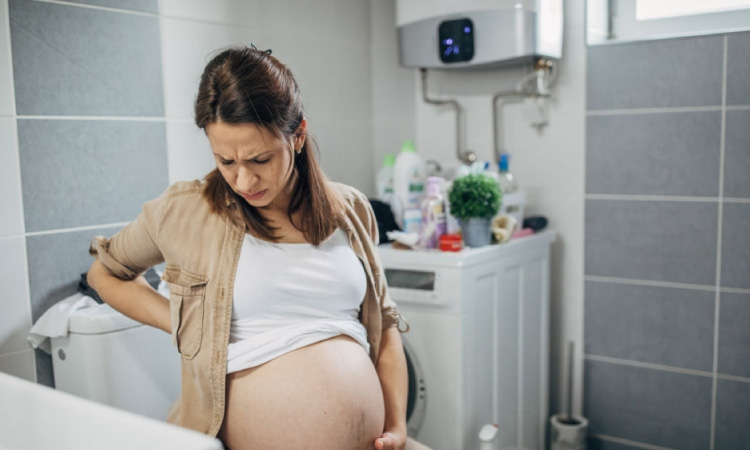Pregnancy causes several changes in your body. While certain pregnancy problems are expected, others, such as black stool during pregnancy, come as a surprise to many women. Is black stool bad during pregnancy? To answer this question, one should understand the causes behind black stools.
To be sure, pregnancy poop isn’t the most fascinating topic to discuss. However, knowing what to expect can reduce the element of surprise and alleviate anxiety when unforeseen events like black stools happen during pregnancy.
Black Specks In Stool During Pregnancy- Is It Normal?
Simple things such as a change in diet, or a particular food one consumed might influence their stool color. Mild gastrointestinal discomfort can also result in black specks in stool during pregnancy. Unchecked constipation during pregnancy, undigested foods, such as blueberries, frequently result in black flecks in the stool. On the other hand, black specks in the stool might be an indication of a serious underlying problem such as intestinal hemorrhage.
What Causes Black Stool During Pregnancy?
Many factors can lead to black stools during pregnancy. Following are some important factors that could bring about black stool during pregnancy.
1. Medication
Intake of certain medications can be a reason for black stool during pregnancy second trimester and third trimester.During the first trimester, the intake of medicines will be minimal. However, once the pregnancy progresses to second and third trimesters women might take medicines for many issues like upset stomach.
Certain medicines might cause feces to become very black in color and tarry inconsistency. Though home remedies are available for abdominal pain, there are some antacids used to soothe upset stomachs which have been linked to black stools. When doctors examine your health, this is generally the first thing they look at. Therefore, pregnant women should consult a doctor if they get black stools after starting a new medicine.
Over-the-counter medicine is easily obtainable and the pregnant woman tends to reach out OTC for simple issues. However, self-medication can be dangerous during pregnancy. Anyway, it is mandatory to inform your doctor if you had any OTC medicines even though it is an antacid.
2. Food
It is often assumed that dark-colored meals induce dark stools. Foods that are known to darken stools include:
Calculate Due Date With LMP
- Blueberries
- Black liquorice
- Beetroot juice
- Chocolate loaded cookies
- Grape juice
- Iron-rich foods
Food colorings can also affect the color of the stool. During pregnancy, it is better to avoid dishes with artificial food colors and other additives. Pregnant women can aid in the identification of the reason for their darker stools by maintaining a food record each time they appear. When you quit consuming the meal that produced the dark hue, dark stool disappears.
Related Reading: 11 Symptoms Of Not Eating Enough While Pregnant
3. Iron supplements
Black stool can be a side effect of iron pills prescribed during pregnancy. This is one of the most common causes of black stool during pregnancy in the first trimester. During pregnancy, your doctor will prescribe you iron supplements – this can cause dark-colored stools.
This usually happens, when iron supplements are introduced as prenatal supplements. And this is quite normal. Iron deficiency anemia is a condition that frequently occurs during pregnancy. Iron supplements are often prescribed to help prevent anemia.
Some types of iron aren’t easily absorbed by the body. This can cause black stools and constipation because the body can’t absorb and use the iron. To avoid dark stools associated with iron supplements, pregnant women can increase iron intake in their diet by eating iron-rich foods like green leafy vegetables. Brown rice are also extremely rich in iron content.
If the black stool is followed by stomach ache, constipation, heartburn, and nausea, it is important to inform the doctor. If the cause is an iron supplement, the doctor will stop it or switch to a different supplement.
Related Reading: Spinach During Pregnancy – Benefits, Risks And Precautions
4. Bleeding

Haemorrhage is one of the most severe causes of dark stools during pregnancy. It might be as little as gastrointestinal bleeding caused by severe GERD, or as catastrophic as intestinal tract haemorrhage.
5. Bleeding ulcer
Another reason for black stools is a bleeding ulcer. An ulcer is a sore that develops on the interior of your stomach or small intestine. These lesions might bleed at times. This can darken your feces.
Blood that has been exposed to stomach acids turns dark and sticky (like tar). This is known as melena, and it indicates an upper gastrointestinal hemorrhage. In the case of melena, the feces will have an exceedingly unpleasant odor in addition to the tarry texture.
Other symptoms of an ulcer include searing pain in your stomach, bloated abdomen, burping, heartburn, nausea, vomiting, or vomit that looks like coffee.
6. Anal fissures
Dark stool during the third trimester of pregnancy can be because of anal fissure. Anal tissues tear, results in anal fissure. The most prevalent cause of anal tear is passing extremely hard or big stools. The risk of anal fissure increases as the third trimester progresses.
The stools that come out through anal fissures will be black. Stools that pass through the anal fissure will be dark in color. Therefore, dark stool combined with severe discomfort while passing stool during pregnancy needs medical attention.
Related Reading: 12 Amazing Health Benefits Of Eating Ragi During Pregnancy
7. Medicines with Bismuth
Pepto-Bismol is an OTC medicine that is used to treat stomach distress, heartburn, indigestion, and diarrhoea. All of these issues are pretty common during pregnancy. This medicine contains bismuth subsalicylate, an element well known as an antidiarrheal agent.
Bismuth can make your tongue and feces black. This color change is harmless and temporary and generally goes away once you stop taking the medication. If you have any additional discomfort after taking this medication, contact your doctor immediately and discontinue use.
Diagnosing The Underlying Issue Causing Black Stool
Doctors can determine the reason for black stools by first reviewing the physical and medical history of the mother. If they believe the data does not point to the cause of the black stools, the doctor will perform:
- Stool examinations
- X-rays
- Blood tests
Related Reading: 12 Relevant Things To Know Before Choosing A Gynecologist
This can help to assess the reasons for the black stool. If these tests fail to reveal the cause, then the doctor will conduct an endoscopy, after weighing its pros and cons, how far the pregnancy progressed, and the physical condition of the pregnant woman.
How To Avoid Black Stool During Pregnancy?

Here are some effective means of avoiding dark stools during pregnancy.
1. Increase fibre consumption
One of the most effective ways to deal with digestive issues during pregnancy is to eat foods high in dietary fiber. Fiber-rich foods can lower the risk of constipation, anal fissures, or hemorrhoids, and thus lower the risk of black stool during pregnancy.
Related Reading: 15 Fruits Not To Eat During Pregnancy
2. Seek the advice of a dietician
It is essential to seek the advice of a dietitian if feasible during pregnancy. Consulting a dietician and developing a meal plan that not only provides your body with all of the minerals, vitamins, and nutrients it requires, but also helps to improve the efficiency of your GI tract.
3. Eat iron-rich foods
To avoid black stool caused by iron supplements, aim to acquire as much iron as through the food. Increase your consumption of iron-rich food. Iron in food is easily absorbed by the body with respect to the supplements. As the iron is quickly absorbed, the chances of black stools will be decreased.
Related Reading: Tofu During Pregnancy- Benefits And Health Risks (Draft m h)
4. Stay hydrated
Since dehydration is one of the most prevalent causes of GI tract health problems. One must be aware of certain ways to beat dehydration during pregnancy. Water is essential for supporting intestinal health. So, remember to drink adequate water and fluids throughout the day. Also, eat water-rich foods like watermelons and cucumbers.
Related Reading: 10 Drinks To Avoid During Pregnancy
5. Stay away from self-medication.
Avoid taking medicines without consulting your doctor. Many OTC medicines have side effects, one of which can be a change in the color of stool. Before using any over-the-counter medicine, see your doctor. Even innocuous medicine can bring about adverse side effects during pregnancy.
6. Workout will help
Remember that exercise is essential to lead a healthy pregnancy. Few exercises should be completely avoided during pregnancy but light exercise helps to enhance digestion and muscle strength. This may help to prevent black stools. Kegel exercises also help to improve the muscle function around the rectal and vaginal regions.
What Can I Do If I Notice Black Stool During Pregnancy?
You should consult your doctor immediately once your stool appears black. The reason for the black stool may not always be serious. However, it is best to rule out any possibility of risk. When you’re pregnant, it is not advisable to take a chance. Therefore, seek professional help to rule out the chances of any potential danger to both you and your child.
Is Black Stool An Indication Of A Miscarriage?

There are a few common causes of a miscarriage but trust us that black stools and miscarriage are not connected. But if black stool during pregnancy is due to some serious issues, then the chances of miscarriage depend on the severity of the underlying issue.
Conclusion
Pregnancy impacts every area of your body. So expect some changes in your bowels as well. Although black stools during pregnancy are not an appealing sign, they do not necessarily signify a serious problem.
Keep in mind that each pregnancy is unique. Similarly, the causes of black feces might also vary with persons. It could be as innocuous as taking iron supplements or eating dark-colored meals, or it could indicate a more serious underlying issue.
Pregnancy poop may not be something you want to discuss, but it is something you must consider. Therefore, never hesitate to consult your doctor, follow their instructions whenever you feel something is not right.

